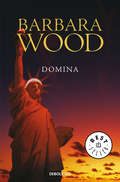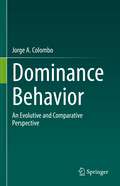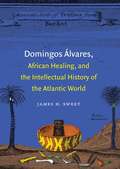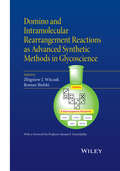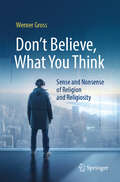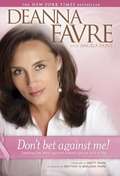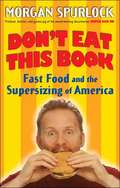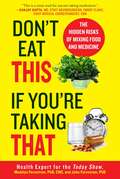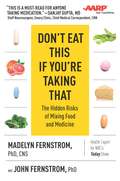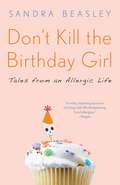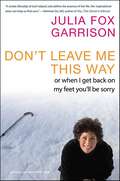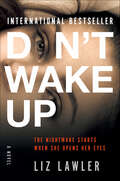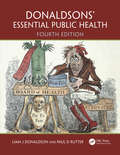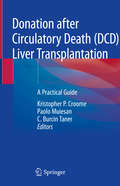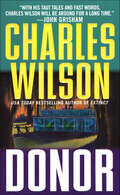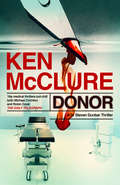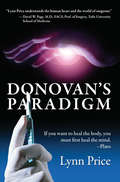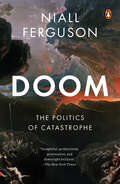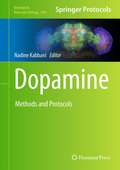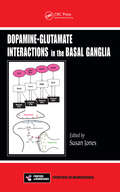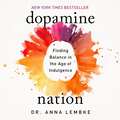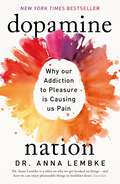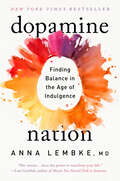- Table View
- List View
Domina
by Barbara WoodOther women would have considered themselves blessed if they had been granted Samantha Hargrave's striking loveliness. But in the Victorian world, her beauty was just one more reason the male medical establishment could not see her as a doctor. Samantha vowed to open their eyes to her dedication, her skill, her desire to make the kind of contribution that only her knowledge both of medicine and of women's special problems could make. And Samantha would fight for her burning dreams until she won--even if it meant closing her heart to Dr. Joshua Masefield, the brilliant mentor whose aid had saved her career ... and whose passion threatened to destroy it. Even if it meant forsaking her memories of Dr. Mark Rawlins, in whose arms she had discovered what it meant to be a complete woman.
Domina
by Barbara WoodSamantha Hargrave nació en Londres en 1860, en un barrio humilde. Desde muy pequeña se había sentido atraída por el tremendo universo del dolor físico y la esperanzadora posibilidad de su remedio. Así que, cuando creció, no tuvo duda sobre qué quería ser. Sin embargo, estudiar -y ejercer- la medicina durante el siglo XIX resultaba prácticamente imposible para una mujer. Por ello, se vio obligada a trasladarse a Estados Unidos, donde, no sin dificultades y humillaciones, logró su ansiado título. Con todo, el camino de su triunfo -la plenitud del amor, el reconocimiento profesional, la lucha por una medicina más humana- sería aún largo y costoso.
Dominance Behavior: An Evolutive and Comparative Perspective
by Jorge A. ColomboThis book approaches two behavioral domains involved with human nature and actions related to dominance, an ancient animal, survival-linked, behavioral drive anchored in basal neural brain circuits. These domains result in latent or manifest conflicts among components of human animal nature and cultural profiles. The first domain refers to evolutive animal behavioral inertias that affect the basic construction of our brain/mind and social behavioral spectrum, underneath cultural and political enclosures. The second domain is considered a consequence of the previous one and involves the concept that the basic animal behavioral drive of dominance interferes with the expression of a truly human, cooperative social construction, and fosters conflicts (based on profit or comparative advantage). This drive tints or conditions our behavior in all its expressions (parochial, social, political, financial, religious, cognitive development). It also fosters social detachment of elite minorities –financially powerful and drivers of human evolutionary trends– from general concerns and collective needs of legions of subdued populations. Additionally, the latter promotes Star Wars factual chimeras and expanding dominance/prevalence and power grip beyond earthbound objectives that promote spatial exploration and scientific objectives. The quest for knowledge is embedded in our behavioral construction but employed by opportunistic – political – strategies that seek dominance/prevalence.Basic, ancestral, animal drives, here focused on dominance, lie underneath our sociocultural expressions, and feed construction of survival, ideology, class prejudices, submissiveness, cooperativity, and technological development. On top of this basic drive, humans have construed additional relational levels (whether of cognitive or emotional nature) expressed as cultural constructions that provide means to attempt to approach a socially acceptable format and public support. Whenever these processes collide or collapse, individual and collective standings tend to generate social changes or individual or collective pathologies. This book should be an exciting read for all those enthusiasts of the human mind, behavior, and cultural evolution ranging from fields such as neuroscience and biology to political sciences and anthropology. Given the breadth of studies as well as the clear language used by the author, students will find this book as a resourceful material for the undergraduate and graduate studies.
Domingos Alvares, African Healing, And The Intellectual History Of The Atlantic World
by James H. SweetBetween 1730 and 1750, Domingos Alvares traversed the colonial Atlantic world like few Africans of his time--from Africa to South America to Europe. By tracing the steps of this powerful African healer and vodun priest, James Sweet finds dramatic means for unfolding a history of the eighteenth-century Atlantic world in which healing, religion, kinship, and political subversion were intimately connected. Alvares treated many people across the Atlantic, yet healing was rarely a simple matter of remedying illness and disease. Through the language of health and healing, Alvares also addressed the profound alienation of warfare, capitalism, and the African slave trade. As a result, he and other African healers frequently ran afoul of imperial power brokers. Nevertheless, even the powerful suffered isolation in the Atlantic world and often turned to African healers for answers. In this way, healers simultaneously became fierce critics of Atlantic imperialism and expert translators of it, adapting their therapeutic strategies in order to secure social relevance and even power. By tracing Alvares' frequent uprooting and border crossing, Sweet illuminates how African healing practices evolved in the diaspora, contesting the social and political hierarchies of imperialism while also making profound impacts on the intellectual discourse of the "modern" Atlantic world.
Domino and Intramolecular Rearrangement Reactions as Advanced Synthetic Methods in Glycoscience
by Zbigniew J. Witczak Roman BielskiThe book consists of a brief introduction, a foreward provided by professor Danishefsky of Columbia University, and about 14 - 16 chapters, each written by one or two eminent scholars/authors describing their recent research in the area of either domino reactions or intramolecular rearrangements in carbohydrate chemistry. Three or four chapters will be reviews. The domino (cascade, tandem) reactions are always intramolecular. They are usually very fast, clean and offer highly complex structures in a one pot process. Intramolecular rearrangements offer very similar advantages and often lead to highly complex products as well. Although many recently isolated carbohydrates fulfill various sophisticated functions, their structures are often very complex. The editors cover the broadest scope of novel methodologies possible. All the synthetic and application aspects of domino/cascade reactions are explored in this book. A second theme that will be covered is intramolecular rearrangement, which is also fast, stereoselective, and often constitutes one or more steps of domino /cascade process. Selected examples of intramolecular rearrangements are presented. Together, both processes offer an elegant and convenient approach to the synthesis of many complex molecules, which are normally difficult to synthesize via alternative routes. It appears that domino and intramolecular rearrangements are ideally suited to synthesize certain specific modified monosaccharides. What is particularly important is that both processes are intermolecular and almost always yield products with very well-defined stereochemistry. This high definition is absolutely crucial when synthesizing advanced, modified mono and oligosaccharides. The choice of contributors reflects an emphasis on both therapeutic and pharmacological aspects of carbohydrate chemistry.
Don't Believe, What You Think: Sense and Nonsense of Religion and Religiosity
by Werner GrossThis nonfiction book addresses the question of what relevance religiosity still holds today and where psychologists set up warning signs. Religions today have a Janus-faced character: On the one hand, they offer emotional support and assistance (not only) in crisis situations – on the other hand, suicide attacks are carried out in their name, and under their guise, sexual abuse of children has flourished (or continues to do so). Religions have lost their innocence worldwide. But what exactly are religions? How did they arise? How have they changed over time? What are the positive aspects of religions – and what are the problematic ones? Where do they help, and where do they harm? What distinguishes them – and what do they have in common? Contents: Religions: World-explaining and meaning-making systems that almost always consider themselves the one true, eternal, and ultimate explanation system. – They structure diffuse, subjective inner truths and unstructured situations, attempting to make the incomprehensible comprehensible. – Basic trust, symbols, ritual actions. – What are spiritual enlightenment experiences? – The origin of all religions is fear, emptiness, meaninglessness, and death. – Religions are good guides in the dark of night – during the day, it’s better to rely on your own eyes. About the author: Werner Gross, Dipl.-Psych., psychotherapist, supervisor, and coach.
Don't Bet Against Me! Beating the Odds Against Breast Cancer and in Life
by Angela Elwell Hunt Deanna FavreFrom the book jacket: AT AGE 35, DEANNA FAVRE HAD IT ALL - A loving husband at the peak of his NFL career Two beautiful daughters A wonderful life... AND BREAST CANCER No one is immune to tragedy. Deanna Favre is living proof. A shy, small-town girl from Kiln, Mississippi, Deanna had always been perfectly content to let her famous husband steal the spotlight. Though married to the NFL's only three-time MVP, she preferred to live a life of quiet anonymity. But on December 22, 2003, the spotlight shifted. When television cameras zeroed in on a somber Deanna watching her grief-stricken husband lead the Green Bay Packers to a Monday night victory over the Oakland Raiders immediately following the death of his father, Deanna's anonymity was lost, and her life changed forever. Tragedy struck again the following October when Deanna's younger brother, Casey, was killed in an ATV accident. Four days later-still reeling from the loss of her brother--Deanna was diagnosed with breast cancer. Through it all, however, Deanna has emerged a survivor. In this candid and inspirational memoir, she shares the triumphs and the tragedies of a life lived both behind the scenes and on center stage. From her years as a single mom and her high-profile marriage to Brett, to her highly publicized battle with breast cancer and the work she is currently doing through the Deanna Favre HOPE Foundation, her story is living testament that with faith. and love, ordinary people can overcome the most extraordinary circumstances. Three years later and cancer-free, Deanna has become one of breast cancer's leading activists. As the founder of the Deanna Favre HOPE Foundation, she now travels the country to speak about the importance of early diagnosis and raises funds to provide early diagnostic services, education, and financial support for uninsured and underinsured women battling breast cancer. Deanna, Brett, and their daughters, Brittany and Breleigh, live in Hattiesburg, Mississippi. With more than three million copies of her books sold worldwide, ANGELA HUNT is the best-selling author of more than one hundred books, including The Tale of Three Trees, The Note, and Magdalene. She and her husband make their home in Florida. DEANNA FAVRE HOPE FOUNDATION A portion of the proceeds for this book will go to the Deanna Favre HOPE Foundation to provide financial support for uninsured and underinsured women battling breast cancer.
Don't Eat This Book: Fast Food and the Supersizing of America
by Morgan Spurlock"Benevolent muckraker" Morgan Spurlock debuts a wry investigative voice that will appeal to anyone interested in the health of our country, our children, and ourselves.
Don't Eat This If You're Taking That
by Madelyn Fernstrom John FernstromNBC Today Show nutrition and health guru Madelyn Fernstrom presents the ultimate guide to food and medicine interaction. While no one wants to take medication to treat diabetes, high blood pressure, heart disease, or other ailments, for millions of people, this is a daily reality. Seven out of ten Americans take prescription drugs. But when it comes to food and medicine interactions, what you don’t know can harm your health. Don’t Eat This If You’re Taking That takes the mystery out of food and medications, providing an easy-to-use guide for anyone taking a medication--short term or long term--that indicates foods to avoid that can interfere with the action of the medication. Readers can easily find a medication, see what foods to avoid, and make some smart swaps. Small diet changes learned from this book can have big health payoffs! An added bonus in each chapter is a Dietary Supplements Alert box, providing the most up-to-date information on interactions with vitamins, minerals, and other dietary supplements. We all believe a diet rich in colorful fruits and vegetables, lean proteins, whole grains, and low-fat dairy products is the path to healthy eating, right? Not always. Consumers can easily personalize their healthiest eating plan to work with not against their medications.
Don't Eat This If You're Taking That: The Hidden Risks of Mixing Food and Medicine
by Madelyn Fernstrom John FernstromNBC Today show nutrition and diet guru Madelyn Fernstrom and award-winning neuroscientist and pharmacologist John Fernstrom -partnering with AARP- present the ultimate guide to food and medicine interaction.Millions of Americans take prescription drugs to treat diabetes, high blood pressure, heart disease, or other conditions. But beware: The foods you eat and the medications you take could be working against each other.Don’t Eat This If You’re Taking That takes the mystery out of food and medication interactions. This easy-to-use guide details foods that can interfere with the action of the medication-whether taken for the short or long term. In this book, readers can easily find a medication, see what foods to avoid, and make smart swaps.We all believe a diet rich in colorful fruits and vegetables, lean proteins, whole grains, and low-fat dairy products is part of healthy eating-right? Not always. Dr. Fernstrom explains exactly what foods to avoid when and why. For instance,If you’re taking cholesterol medicine, you should cut out-or cut down on-grapefruit.On a blood thinner? Avoid dark green veggies.If you’re on thyroid medication, nix the soy.And more small diet changes with big health payoffs!As an added bonus, each chapter offers a "Dietary Supplements Alert” box, providing the most up-to-date information on interactions with vitamins, minerals, and other dietary supplements.With this concise, scientifically based guide, consumers can easily personalize their eating plan to work with, not against, their medications.
Don't Eat Your Heart Out Cookbook
by Joseph C. PiscatellaHow to reduce cholesterol, salt, fat and sugar, and still eat tasty food. How to adapt everyday recipes for healthful eating. How to permanently change eating habits. How to read and understand labels. How to lose weight and keep it off. How to handle eating in a restaurant, and more.
Don't Kill the Birthday Girl: Tales from an Allergic Life
by Sandra BeasleyA beautifully written and darkly funny journey through the world of the allergic. Like twelve million other Americans, Sandra Beasley suffers from food allergies. Her allergies--severe and lifelong--include dairy, egg, soy, beef, shrimp, pine nuts, cucumbers, cantaloupe, honeydew, mango, macadamias, pistachios, cashews, swordfish, and mustard. Add to that mold, dust, grass and tree pollen, cigarette smoke, dogs, rabbits, horses, and wool, and it's no wonder Sandra felt she had to live her life as "Allergy Girl." When butter is deadly and eggs can make your throat swell shut, cupcakes and other treats of childhood are out of the question--and so Sandra's mother used to warn guests against a toxic, frosting-tinged kiss with "Don't kill the birthday girl!" It may seem that such a person is "not really designed to survive," as one blunt nutritionist declared while visiting Sandra's fourth-grade class. But Sandra has not only survived, she's thrived--now an essayist, editor, and award-winning poet, she has learned to navigate a world in which danger can lurk in an unassuming corn chip. Don't Kill the Birthday Girl is her story. With candor, wit, and a journalist's curiosity, Sandra draws on her own experiences while covering the scientific, cultural, and sociological terrain of allergies. She explains exactly what an allergy is, describes surviving a family reunion in heart-of-Texas beef country with her vegetarian sister, delves into how being allergic has affected her romantic relationships, exposes the dark side of Benadryl, explains how parents can work with schools to protect their allergic children, and details how people with allergies should advocate for themselves in a restaurant. A compelling mix of memoir, cultural history, and science, Don't Kill the Birthday Girl is mandatory reading for the millions of families navigating the world of allergies--and a not-to-be-missed literary treat for the rest of us.From the Hardcover edition.
Don't Leave Me This Way: Or When I Get Back on My Feet You'll Be Sorry
by Julia Fox GarrisonJulia Fox Garrison refused to listen to the professionals she called Dr. Jerk and Dr. Panic, who—after she suffered a massive, debilitating stroke at age thirty-seven—told her she'd probably die, or to Nurse Doom, who ignored her emergency call button. Instead she heeded the advice of kind, gifted Dr. Neuro, who promised her he would "treat your mind as well as your body." Julia figured if she could somehow manage to get herself into a wheelchair, at least she'd always find parking. But after many, many months of hospitalization and rehab—with the help of family, friends, and her own indomitable spirit—Julia not only got into a wheelchair, but she got back out.Don't Leave Me This Way is the funny, inspiring, profoundly moving true story of a woman's fight for her life and dignity—and her determined quest to awaken an entrenched, unfeeling medical community to the fact that there's always a human being inside every patient.
Don't Wake Up: A Novel
by Liz LawlerA harrowing psychological thriller debut about a woman who awakens after an assault with no physical proof of the attack and who must try to convince everyone of what really happened.When Dr. Alex Taylor opens her eyes, she is hooked up to an IV, is bound to an operating table, and her legs are raised in stirrups. Disoriented and alarmed, she assumes she's been anesthetized and brought to surgery after being in an accident. But the man standing over her, with his face hidden behind a surgical mask and wielding instruments, is no doctor she recognizes at the hospital where she works as a successful and respected doctor. He’s a stranger—and he’s calmly and methodically telling her how he's about to attack her. Before Alex can even scream for help, she succumbs to another dose of anesthesia, rendering her unable to defend herself….When she comes to on a gurney, she finds herself surrounded by her colleagues and immediately reports the attack and rape. The police are skeptical of her bizarre story. And after a physical exam reveals no proof of any attack, even her boyfriend has doubts. Despite Alex's adamant claims, no one believes her, leaving her to wonder if she has, in fact, lost her mind.Until she meets the next victim…An edge-of-your-seat psychological thriller, Don't Wake Up is also a provocative, timely exploration of victimhood, abuse, and the discrediting of women in our culture.
Donaldsons' Essential Public Health
by Paul Rutter Liam J. DonaldsonDonaldsons’ Essential Public Health has been in continuous print for 35 years, evolving through successive editions. This unrivalled record of success for a textbook of public health shows the enduring appeal of its content, style, and accessibility to generations of students and practitioners. For many of today’s national and global public health leaders, the book was their guide as they began their careers, their benchmark as they passed their examinations and professional accreditation, and remains their companion as a source of reference and refreshed knowledge for teaching and practice. The book brings together, in one volume, the main health problems experienced by populations and by the key groups within them, the strategies for promoting health and preventing disease, the principles and applications of epidemiology, the main themes of health policy, and a description of health service provision. This fourth edition marks the biggest change to the book in 20 years. For the first time it sets each key subject area in a global health context, whilst retaining its traditional strength in covering population health for the United Kingdom. New and revised chapters for this edition include: Health in a changing world Communicable diseases Non-communicable diseases Social determinants of health Quality and safety of healthcare Mental health Disability Health in later life Environment and health History of public health The content is wide-ranging and written in an accessible and engaging style. It covers topics as diverse as: the story of the 2014 Ebola virus outbreak in West Africa; the elements of tobacco control policy; the health impact of climate change; the global health organisational architecture; the concept of health; the new paradigm of public mental health; the biological pathways that link to the health effects of social deprivation; the ideal of universal health coverage; the essentials of immunisation; the basis of healthy ageing; the historical events that led to the germ theory of disease and the Victorian sanitary revolution. This new edition is essential reading for all undergraduate and postgraduate students of public health, medicine, nursing, health policy, social science, and public sector management. Those embarking on a career in public health will find it of great value throughout their professional life. The book is also an extremely useful resource for established practitioners in primary care, doctors, senior nurses, health system managers, healthcare policy makers, civil servants in ministries of health, and members of boards of health organisations.
Donation after Circulatory Death (DCD) Liver Transplantation: A Practical Guide
by Kristopher P. Croome Paolo Muiesan C. Burcin TanerThis book presents the first comprehensive review of all facets of liver transplantation using DCD donors. Each of the 19 chapters are written by leading experts in the field, representing some of the most experienced DCD liver transplant programs in the world. Several topics have overlapping coverage in different chapters, providing the reader with the perspective of multiple experts on crucial topics. Chapters also highlight the steps towards building a DCD liver transplant program, the importance of donor and recipient selection, as well as state-of-the-art developments and future directions in the utilization of these organs.Donation after Circulatory Death (DCD) Liver Transplantation serves as a valuable resource for all those involved in liver transplantation using DCD donors.
Donor
by Charles WilsonYoung ER doctor Michael Sims feels too many of his patients are dying without cause. Shannon Donnelly, the Congressman's beautiful daughter, believes the police are wrong in ruling her father's death a suicide. Now they're teaming up uncover the truth about a terrifying medical experiment involving nerve regeneration and organ transplants. It's backed by millions of dollars. It's protected at the highest levels of government. But there are no volunteers, no donors. There are only ordinary people who check into this Mississippi hospital...and discover that death isn't he worst thing they have to fear. Getting "chosen" is....
Donor (The Dr Steven Dunbar Thrillers)
by Ken McClureFirst in the series featuring the ex-Special Forces medic: &“His medical thrillers out-chill both Michael Crichton and Robin Cook.&” —Daily Telegraph When seven-year-old Amanda Chapman is admitted to the hospital with acute renal failure, her parents are in despair. Their hope is renewed when Amanda is accepted for treatment in a pioneering, state-of-the-art dialysis unit in an exclusive private hospital in Glasgow, Scotland. But behind the lavish hospital corridors, private rooms, and friendly staff lies something much more sinister, and Dr. Steven Dunbar must go undercover to find it—and stop it . . .
Donovan's Paradigm
by Lynn PriceNew surgeon Kim Donovan runs afoul of lead surgeon Erik Behler when she tries to institute an innovative program that challenges the traditional foundations of medicine. The resulting fallout alters the terrain of their lives and the future of medicine within the hospital.
Doom: The Politics of Catastrophe
by Niall Ferguson"All disasters are in some sense man-made."Setting the annus horribilis of 2020 in historical perspective, Niall Ferguson explains why we are getting worse, not better, at handling disasters.Disasters are inherently hard to predict. Pandemics, like earthquakes, wildfires, financial crises. and wars, are not normally distributed; there is no cycle of history to help us anticipate the next catastrophe. But when disaster strikes, we ought to be better prepared than the Romans were when Vesuvius erupted, or medieval Italians when the Black Death struck. We have science on our side, after all. Yet in 2020 the responses of many developed countries, including the United States, to a new virus from China were badly bungled. Why? Why did only a few Asian countries learn the right lessons from SARS and MERS? While populist leaders certainly performed poorly in the face of the COVID-19 pandemic, Niall Ferguson argues that more profound pathologies were at work--pathologies already visible in our responses to earlier disasters.In books going back nearly twenty years, including Colossus, The Great Degeneration, and The Square and the Tower, Ferguson has studied the foibles of modern America, from imperial hubris to bureaucratic sclerosis and online fragmentation.Drawing from multiple disciplines, including economics, cliodynamics, and network science, Doom offers not just a history but a general theory of disasters, showing why our ever more bureaucratic and complex systems are getting worse at handing them.Doom is the lesson of history that this country--indeed the West as a whole--urgently needs to learn, if we want to handle the next crisis better, and to avoid the ultimate doom of irreversible decline.
Dopamine
by Nadine KabbaniDopamine, a catecholamine transmitter, plays a number of vital physiological roles in the brain and body, and, in recent years, studies on the role of dopamine in disease have opened new avenues of research and discovery. In Dopamine: Methods and Protocols, experts and key figures within the field provide detailed protocols on leading approaches in the study of dopamine within biological systems. Divided into sections on cellular/biochemical, imaging, genetics, and electrophysiology, this collections includes protocols for bioluminescence and fluorescence imaging, receptor immunoprecipitation and proteomic analysis, creation and characterization of a mouse model of Parkinson's disease, real time measurement of dopamine in the brain, and modeling signal transduction in silico. Written in the highly successful Methods in Molecular BiologyTM series format, chapters include introductions to their respective subjects, lists of materials and reagents, step-by-step, readily reproducible laboratory protocols, and tips on troubleshooting and avoiding known pitfalls. Authoritative and convenient, Dopamine: Methods and Protocols serves as an ideal guide for students and experts alike, as well as for anyone interested in exploring the vast and crucial field of dopamine research.
Dopamine - Glutamate Interactions in the Basal Ganglia
by Susan JonesThe basal ganglia are involved in complex brain functions, from voluntary movement control to learning and reward processing, and they are implicated in numerous neurological and psychiatric disorders. Information from the cerebral cortex and thalamus is conveyed to basal ganglia nuclei via glutamate release, while dopamine from the midbrain is rel
Dopamine Nation: Finding Balance in the Age of Indulgence
by Dr Anna LembkeAll around us people are looking at their phones too much, eating too much, drinking too much. Our world is addicted to fleeting distracting pleasures that get us nowhere. Dr Anna Lembke provides a clear way back to a balanced life.This audiobook is about pleasure. It's also about pain. Most importantly, it's about how to find the delicate balance between the two, and why now more than ever finding balance is essential. We're living in a time of unprecedented access to high-reward, high-dopamine stimuli: drugs, food, news, gambling, shopping, gaming, texting, sexting, Facebooking, Instagramming, YouTubing, tweeting... The increased numbers, variety, and potency is staggering. The smartphone is the modern-day hypodermic needle, delivering digital dopamine 24/7 for a wired generation. As such we've all become vulnerable to compulsive overconsumption.In Dopamine Nation, Dr. Anna Lembke, psychiatrist and author, explores the exciting new scientific discoveries that explain why the relentless pursuit of pleasure leads to pain...and what to do about it. Condensing complex neuroscience into easy-to-understand metaphors, Lembke illustrates how finding contentment and connectedness means keeping dopamine in check. The lived experiences of her patients are the gripping fabric of her narrative. Their riveting stories of suffering and redemption give us all hope for managing our consumption and transforming our lives. In essence, Dopamine Nation shows that the secret to finding balance is combining the science of desire with the wisdom of recovery.'Dr Anna Lembke is a whiz on why we get hooked on things - and how we can enjoy pleasurable things in healthier doses.' - The Guardian(P) 2021 Penguin Random House Audio
Dopamine Nation: Finding Balance in the Age of Indulgence
by Dr Anna Lembke'Her stories have the power to transform your life' Lori Gottlieb, bestselling author of Maybe You Should Talk to Someone 'Radically changes the way we think about mental illness, pleasure, pain, reward and stress' Daniel Levitin, bestselling author of The Organized MindTHE NEW YORK TIMES AND SUNDAY TIMES BESTSELLER We are a wired generation. In these fast-paced times we are constantly bombarded by high-reward, high-dopamine stimuli. From texting to social media, food to drugs, gambling to shopping, we have become addicted to fleeting and distracting pleasures that are making us sick.In Dopamine Nation, psychiatrist and bestselling author Dr Anna Lembke reveals why our relentless pursuit of pleasure leads to pain and what we can do about it. Bringing together cutting-edge neuroscience with the gripping real life experiences from her clinical practice, Lembke explores how contentment and connectedness are essential tools in keeping dopamine in check. This is an essential book for anyone wanting to find a balance for a happier life.
Dopamine Nation: Finding Balance in the Age of Indulgence
by Dr. Anna LembkeINSTANT NEW YORK TIMES and LOS ANGELES TIMES BESTSELLER&“Brilliant . . . riveting, scary, cogent, and cleverly argued.&”—Beth Macy, author of Dopesick,as heard on Fresh AirThis book is about pleasure. It&’s also about pain. Most important, it&’s about how to find the delicate balance between the two, and why now more than ever finding balance is essential. We&’re living in a time of unprecedented access to high-reward, high-dopamine stimuli: drugs, food, news, gambling, shopping, gaming, texting, sexting, Facebooking, Instagramming, YouTubing, tweeting . . . The increased numbers, variety, and potency is staggering. The smartphone is the modern-day hypodermic needle, delivering digital dopamine 24/7 for a wired generation. As such we&’ve all become vulnerable to compulsive overconsumption. In Dopamine Nation, Dr. Anna Lembke, psychiatrist and author, explores the exciting new scientific discoveries that explain why the relentless pursuit of pleasure leads to pain . . . and what to do about it. Condensing complex neuroscience into easy-to-understand metaphors, Lembke illustrates how finding contentment and connectedness means keeping dopamine in check. The lived experiences of her patients are the gripping fabric of her narrative. Their riveting stories of suffering and redemption give us all hope for managing our consumption and transforming our lives. In essence, Dopamine Nation shows that the secret to finding balance is combining the science of desire with the wisdom of recovery.

